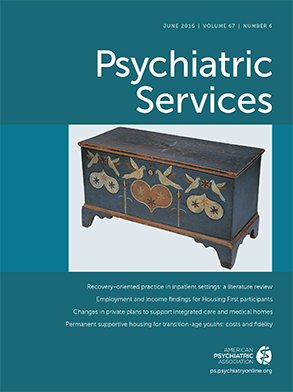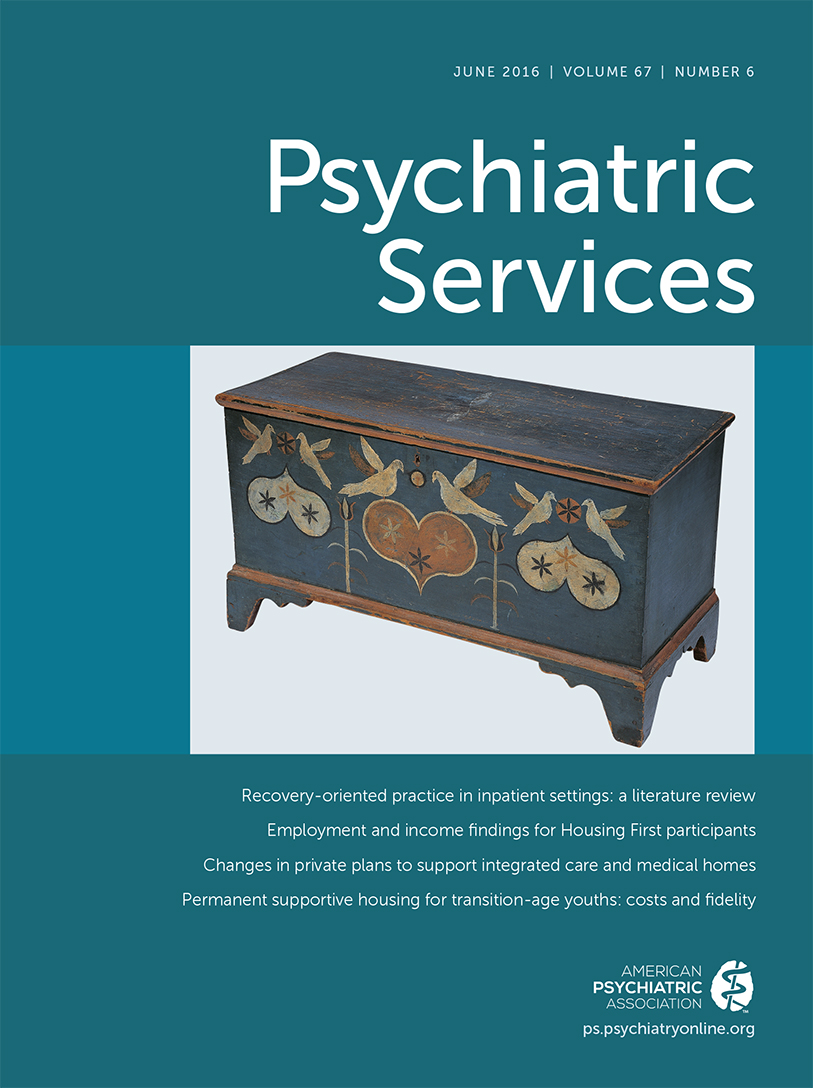Family members often play an important role in the lives of adults with serious mental illnesses. Families frequently seek information and supports regarding treatments, resources, coping with their relative’s illness, and problem solving in order to help their relative (
1–
6). There is an extensive evidence base regarding clinical family psychoeducation models. These interventions last nine months or more, are delivered by clinicians at a treatment program that the individual with mental illness is attending, and are focused on reducing relapse rates of clients (
7). These models are valuable, but dissemination and implementation have been limited and difficult to sustain (
8). Also, these types of programs do not provide supports to families whose ill relative is not willing to participate in family psychoeducation, even if such a program were offered. Furthermore, these programs do not tap into the tremendous community-based peer support available to families.
This gap and need led to the creation of the Family-to-Family (FTF) education program, developed by Joyce Burland, Ph.D., and widely disseminated by the National Alliance on Mental Illness (NAMI) (
9). FTF is a program for families of adults experiencing mental illness. Participants learn about mental illness, treatment models, medication adherence, and the process of rehabilitation in two- to three-hour dyadic group sessions. FTF is a 12-week, in-person, curriculum-based program implemented by trained family member volunteers. Grounded in theories of stress, adaptation, coping, trauma recovery, and support (
9,
10), the program has been established as an evidence-based practice on the basis of three studies conducted in Maryland; the most recent study was a randomized trial (
9–
11). These studies found evidence that FTF reduced subjective burden and distress and improved empowerment, mental health knowledge, self-care, and family functioning.
NAMI–NYC Metro is the largest local affiliate of NAMI. It serves 15,000 New Yorkers annually. It is a trusted representative of individuals living with serious mental illness and their family members on a local and state level and has been providing FTF for more than 25 years to one of the most diverse communities in the world. New York City’s mental health services are relatively dynamic and multifaceted in response to the sundry communities they serve. Despite the many available services, family members of adults living with serious mental illness experience substantial unmet need for education and support. In our experience, FTF has helped to address that unmet need. The organization thus feels a high level of responsibility to the New York City community to provide effective services. Over the years, graduates of the course have anecdotally reported reunification with loved ones, significantly improved family interactions, and overall enhanced health and wellness for the entire family. The positive anecdotal outcomes we have observed are consistent with the research from Maryland demonstrating FTF’s benefits.
To ensure that the same level of quality was being provided to the diverse communities of New York City, NAMI–NYC Metro engaged in independent research on the outcomes achieved by its FTF program. This study aimed to extend these findings in a different setting to determine the generalizability of previous results.
Evaluation of the NAMI–NYC Metro FTF Program
Sample and procedures
The study used data obtained from NAMI–NYC Metro, which serves the five boroughs in New York City. Data for the study reported here were provided for research by NAMI after the evaluation of the FTF program concluded. Secondary data analysis was approved by the New York University Institutional Review Board. FTF participants were recruited through national or local NAMI Web sites, flyers, mental health and social services professionals, family member support groups, and past participants. Helpline workers also recruited callers who self-identified as family members and adults living with mental illness. A NAMI FTF coordinator screened participants for eligibility that required self-identification as a family member or as a significant other or friend of an adult with mental illness.
Program impact was assessed by using surveys administered to participants by trained family member volunteers in person at the beginning of the FTF program and at completion three months later. Participant oral consent to use the information for program evaluation was obtained in person by the volunteer. Measures to assess caregivers’ experiences caring for adults with serious mental illness, mental health knowledge, and coping strategies were examined by using the Family Empowerment Scale (
12), the Family Experience Interview Schedule (
13), the McMaster Family Assessment Device general functioning subscale (
14), and the Brief COPE Inventory (
15). These measures were previously used or adapted from prior studies (
9–
12). Additional measures were administered, including the Self-Care Inventory (
16) and a knowledge index adapted from the curriculum. The Self-Care Inventory included items such as engaging in comforting activities with others, visiting places, allowing for quality time, and expressing one’s feelings. The knowledge index inquired about participants’ ability to recognize the signs and symptoms of mental illness, understand the types of services people with mental illness need, understand what “living in recovery” means as it relates to mental illnesses, see the symptoms of the mental illness as separate from the person who has the illness, and name the medication that his or her relative is taking.
A total of 121 individuals who enrolled in FTF between September 2013 and July 2014 participated in the original evaluation and completed baseline assessments. Of those, 83 (69%) completed follow-up assessments. Paired-samples t tests compared scores at baseline and program completion for each measure. Teachers provided information on the number of sessions each individual attended.
Findings
Most of the 83 participants were female (N=61, 77%), 76% (N=61) were over age 50, and 63% (N=40) were parents of adults with a diagnosis of mental illness. Race-ethnicity was as follows (data missing for four persons): white, 51% (N=40), black, 20% (N=16), and Hispanic, 17% (N=13). Less than 10% of the sample was Asian, native Hawaiian, other, or multiple race. On average, participants attended 11 of 12 program sessions (SD=1.38). Individuals who completed only the baseline assessment did not differ on the basis of gender, race, or any baseline score from those who completed both assessments.
After completing FTF, individuals had improved family empowerment, family functioning, engagement in self-care activities, self-perception of mental health knowledge, and emotional acceptance as a form of coping. Scores on the coping subscales and for emotional support and positive reframing also improved significantly. Displeasure in caring for the family member, a measure of subjective burden, significantly declined. [A table presenting these results, along with effect sizes, is included in an online supplement to this column.]
Discussion and Conclusions
The positive multidimensional effects of FTF observed in Maryland were duplicated in this study conducted in New York City. Improvements in empowerment, coping, family functioning, self-care, and knowledge, as well as reductions in subjective burden, are consistent with previous FTF studies. This study demonstrated gains in additional aspects of coping, including positive reframing and emotional support. Scores on a validated measure of self-care also improved, extending the finding of previous studies. Despite the lack of a control group and the limited sample size, this study further supports the efficacy of the FTF program with a distinct urban population living in a geographic area different from that of the Maryland study.
As these results indicate, caregivers need supports that encourage shifts in what they try to control or influence and what they view as decisions they must make and that help them remember the need to change their expectations and to care for themselves (
17). Lucksted and colleagues (
17) explained that family peer-led programs enhance participants’ confidence to care for their family member while reducing the tension and frustration through better family communication and by a changing mindset that provides them with greater acceptance and hope regarding their role in supporting an adult with mental illness. This evaluation provides further support for the benefits of FTF and its utility in helping families help themselves and support their relative with a mental disorder.
This study is important to the residents of New York City because NAMI–NYC Metro was able to provide evidence for FTF’s effectiveness in the diverse community of New York City. The study also shows that the organization is willing to evaluate its own programs in a transparent manner. The new health care system established by the Affordable Care Act puts a high premium on demonstration of improved outcomes. In this environment, we hope that establishing the efficacy of FTF in New York City will further strengthen NAMI–NYC Metro’s reputation as a provider of high-quality family support services, increase funding opportunities to allow the program to be scaled to meet expected new demand for FTF, and offer education that allows family members to more effectively support the recovery of their relatives experiencing serious mental illness.

